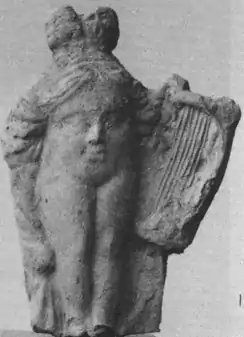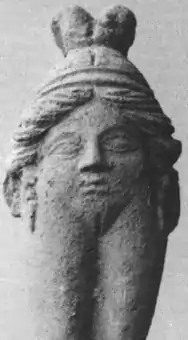Baubo
Baubo (Ancient Greek: Βαυβώ) is an old woman in Greek mythology which appears particularly in the myths of the early Orphic religion. Known as the goddess of mirth, she is depicted as bawdy and sexually liberated, and is said to have jested with Demeter when that goddess was mourning the loss of her daughter, Persephone.

Scholarly discussion
In The Greek Myths (1955), Robert Graves writes that when the disguised Demeter was the guest of King Celeus in Eleusis, the king's lame maid Iambe:
... tried to console Demeter with comically lascivious verses, and a dry nurse, old Baubo, persuaded her to drink barley-water by a jest: she groaned as if in great travail and, unexpectedly, produced from beneath her skirt Demeter's own son Iacchus, who leapt into his mother's arms and kissed her.[1]
Graves writes:

Iambe and Baubo personify the obscene songs, in iambic metre, which were sung to relieve emotional tension at the Eleusinian Mysteries; but Iambe, Demeter, and Baubo form the familiar triad of maiden, nymph, and crone. Old nurses in Greek myth nearly always stand for the goddess as crone.[2]
The following excerpt is taken from Clement of Alexandria's Exhortation to the Greeks, from a 1919 English translation:
Baubo, having received Demeter as a guest, offers her a draught of wine and meal. She declines to take it, being unwilling to drink on account of her mourning. Baubo is deeply hurt, thinking she has been slighted, and thereupon uncovers her secret parts and exhibits them to the goddess. Demeter is pleased at the sight, and now at least receives the draught, — delighted by the spectacle! These are the secret mysteries of the Athenians! These are also the subjects of Orpheus' poems. I will quote you the very lines of Orpheus, in order that you may have the originator of the mysteries as witness of their shamelessness: "This said, she drew aside her robes, and showed a sight of shame; child Iacchus was there, and laughing, plunged his hand below her breasts. Then smiled the goddess, in her heart she smiled, and drank the draught from out the glancing cup."[3]
Baubo figurines
Figurines known as Baubos are found in a number of settings, usually with Greek connections. They were mass-produced in a number of styles, but the basic figure always exposes the vulva in some way:
- A plump woman with her legs held apart, gesturing to her exposed vulva.
- A naked splay-legged figure holding a harp on the back of a boar.
- A naked headless torso with the face in the body and the vulva in the chin of the face.
- A seated figure with an exaggerated vulva filling the space between the legs.
- A naked squatting figure with her hands on her genitalia
The figurines usually had elaborate headdresses, and some hold cups or harps. Some figurines have a loop moulded into the head, which seems to indicate that they were suspended in some way (possibly as an amulet).
See also
References
- Graves, Robert (1996). The Greek Myths. Vol. 1. London: Folio Society. p. 92.
- Graves, Robert (1996). The Greek Myths. Vol. 1. London: Folio Society. p. 96.
- Clement of Alexandria. Translated by Butterworth, G. W. (1919), Loeb Classical Library, volume 92. Cambridge, Massachusetts. Harvard University Press.
Bibliography
- O' Higgins, Laurie (2003). Women and Humor in Classical Greece. Cambridge, UK; New York: Cambridge University Press.
- Lubell, Winifred Milius (1994). The Metamorphosis of Baubo. Nashville, Tennessee: Vanderbilt University Press.
- Murray, Margaret (1934). "Female Fertility Figures". Journal of the Royal Anthropological Institute. LXIV.
The following books are mostly about medieval sexual sculpture but have sections on Baubo:
- Dr. Jørgen Andersen, The Witch on the Wall: Medieval Erotic Sculpture in the British Isles, 1977.
- Miriam Robbins Dexter and Victor H. Mair, Sacred Display: Divine and Magical Female Figures of Eurasia. Amherst, New York: Cambria Press, 2010.
- Anthony Weir and James Jerman, Images of Lust: Sexual Carvings on Medieval Churches, 1986.
External links
- Examples of Baubo figurines
- Baubo in Clement of Alexandria's Exhortation to the Greeks The story of Baubo as related by Clement of Alexandria.
- Baubo figurines from the temple of Demeter at Priene, Turkey Face-in-body Baubo figurines.